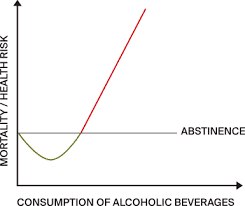Dr Justus Apffelstaedt: Moderation misunderstood – the case for smarter wine health messaging
By Justus Apffelstaedt, 24 July 2025

1
Science without connection to real life is a meaningless ivory tower activity. Ideally, science improves real people’s lives. For example, the mortality of breast cancer roughly halves every ten years. This great achievement is the result of painstakingly etching out 1 and 2% survival benefits in clinical trials comparing two treatments in large patient groups. The sum of these numerous small steps over a decade is a rather dramatic improvement in the survival of the individual cancer victim.
Likewise, about ten thousand years ago man- and womankind figured out that fermentation made grape juice a much more palatable and healthy drink than water from an unhygienic source (and that the resulting beverage had some pleasant side-effects). Inevitably, insatiable curiosity led to research in the medical effects of all manner of fermented beverages. In the early 2000s this resulted in the realisation, that “moderate” consumption of alcoholic beverages leads to an improvement in longevity.

Since then and until a recent sharp and unscientific turn of the WHO towards a prohibitionist stance, the scientific establishment has rightly maintained that consumption of the equivalent of about two glasses of wine for males and one glass of wine for females daily prolongs life by reduction of cardiovascular deaths. Large population studies into dietary habits and mortality established the so-called J-curve. It looks like a Nike swoosh: Taking zero consumption as a base-line, initially mortality decreases with increasing consumption to the inflection point at the equivalent of about two glasses of wine whereafter mortality increases steadily with rising consumption to cross the zero consumption base-line at about four glasses and continuing to rise.
Has 20 years of preaching that moderate (wine) consumption is beneficial for your health reached the audience? It seems not so much. A recent YouGov poll conducted on a representative sample of the U.S. population and published in the 17 July issue of The Economist – the venerable weekly – offers some interesting insights.: One of the most striking results is that about 25% of all adults regardless of gender feel that “moderate” consumption of alcoholic beverages is zero consumption; this trend was most pronounced in younger male respondents. For me that means, that a quarter of the population excludes itself from the health benefits of moderate wine consumption. You could write this off to the argument that wine consumption is an acquired habit and will follow in due course. One can have one’s doubts about this assertion. As an aside, this represents a major marketing challenge for the wine industry.
Another interesting finding was that a larger proportion of females regarded consumption above the medically most beneficial level still as “moderate” compared to males who seemed to have a reasonably good idea of what level of consumption was good for them. Maybe social equality of the sexes has led to some women forgetting that there are some biological differences between men and women when it comes to health issues? This last contention is supported that the more expansive view on consumption was most pronounced in the younger female respondents in the poll.
Lastly, more than one in ten men still thinks that drinking more than four standard drinks per day – a level of drinking that is clearly on the substance abuse side of the spectrum – is still moderate. No comment required.
Where does that leave us? You could argue that this was a US poll and therefore irrelevant for South Africa but I haven’t found anything comparable and have my doubts that South Africans have a better idea about what constitutes “moderate” consumption of alcoholic beverages, notably wine. I strongly suspect that similar trends as observed in the US will be present here and indicate an urgent need for better communication of us medical scientists with the public. I for one am prepared to accept this challenge by writing for Winemag. Cheers to that!
- Dr. Justus Apffelstaedt is a specialist in breast and thyroid health, leading Apffelstaedt & Associates in Cape Town and Windhoek. A surgeon with a specific interest in surgical oncology and researcher, he was Associate Professor of Surgery at Stellenbosch University (1994–2017) and Head of Surgical Oncology, managing 1,000-plus cancer cases annually. He has more than 50 publications, shaped South Africa’s breast cancer screening policy, and co-founded Breast Surgery International. A sought-after speaker, he has given over 100 international lectures. He also holds an MBA and a Diploma in Wine. Through Apffelstaedt & Associates, he continues to advance specialized, patient-centered care in Southern Africa.







Greg | 25 July 2025
Super article. This is an important and contemporarily relevant matter for the wine industry. Kudos to Winemag for for giving it ongoing profile.